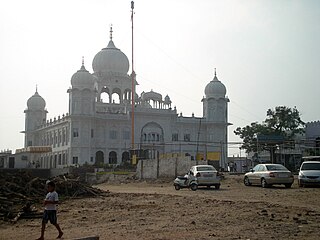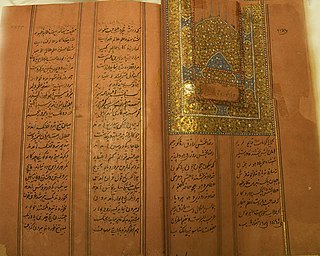
The Khalistan movement is a separatist movement seeking to create a homeland for Sikhs by establishing an ethno-religious sovereign state called Khalistan in the Punjab region. The proposed boundaries of Khalistan vary between different groups; some suggest the entirety of the Sikh-majority Indian state of Punjab, while larger claims include Pakistani Punjab and other parts of North India such as Chandigarh, Haryana, and Himachal Pradesh. Shimla and Lahore have been proposed as the capital of Khalistan.

Guru Gobind Singh was the tenth and last human Sikh Guru. He was a warrior, poet, and philosopher. In 1675, at the age of nine he was formally installed as the leader of the Sikhs after his father Guru Tegh Bahadur was executed by Emperor Aurangzeb. His father was the ninth Sikh Guru. His four biological sons died during his lifetime – two in battle and two executed by the Mughal governor Wazir Khan.

Guru Hargobind was the sixth of ten Gurus of the Sikh religion. He had become Guru at the young age of eleven, after the execution of his father, Guru Arjan, by the Mughal emperor Jahangir.
The following outline is provides an overview of Sikhism, or Sikhi.

Anandpur Sahib, also referred simply as Anandpur, is a city in Rupnagar district (Ropar), on the edge of Shivalik Hills, in the Indian state of Punjab. Located near the Sutlej River, the city is one of the most sacred religious places in Sikhism, being the place where the last two Sikh Gurus, Guru Tegh Bahadur and Guru Gobind Singh, lived. It is also the place where Guru Gobind Singh founded the Khalsa Panth in 1699. The city is home to Takhat Sri Kesgarh Sahib, the third of the five Takhts in Sikhism.

The Battle of Gujrat was a decisive battle in the Second Anglo-Sikh War, fought on 21 February 1849, between the forces of the East India Company, and a Sikh army in rebellion against the company's control of the Sikh Empire, represented by the child Maharaja Duleep Singh who was in British custody in Lahore. The Sikh army was defeated by the British regular and Bengal Army forces of the British East India Company. After it capitulated a few days later, the Punjab was annexed to the East India Company's territories and Duleep Singh was deposed.

Nada Sahib is a Sikh gurudwara in the Panchkula district of the Indian state of Haryana. Situated on the banks of the Ghaggar-Hakra River in the Sivalik Hills of Panchkula, it is the site where Guru Gobind Singh Ji halted while travelling from Paonta Sahib to Anandpur Sahib after the Battle of Bhangani in 1688.

The Battle of Jamrud was fought between the Emirate of Afghanistan under Emir Dost Mohammad Khan and the Sikh Empire under Maharaja Ranjit Singh on 30 April 1837. Afghan forces confronted the Sikh forces at Jamrud. The garrisoned army was able to hold off the Afghans till Sikh reinforcements arrived to relieve them.

The Battle of Chamkaur, also known as Battle of Chamkaur Sahib or the Second battle of Chamkaur, was fought between the Khalsa, led by Guru Gobind Singh, and the coalition forces of the Mughals led by Wazir Khan and Hindu hill chiefs. Guru Gobind Singh makes a reference to this battle in his letter Zafarnama.
The arrival of Sikhism in Wales is relatively recent. As of the 2021 United Kingdom census there were 4,048 Sikhs in the country representing 0.1% of the population.

The Battle of Sri Muktsar Sahib(Muktsar) or Battle of Khidrāne Dee Dhāb took place on 29 December 1705, (29 Poh) following the siege of Anandpur Sahib. In 1704, Anandpur Sahib was under an extended siege by the allied forces of the Mughals and the Hill States of Shivalik.

The 23rd Sikh Pioneers were a regiment of the British Indian Army. They could trace their origins to 1857, when they were known as the 15th (Pioneer) Regiment of Punjab Infantry. The regiment was mainly recruited from the Ramdasia Chamar Sikhs of Punjab Province, later due to not get Mazhbis during 1857 Campaign Siege of Delhi, British officers mixed the class composition of the regiment with Ramdasia Sikhs who are also untouchable caste with having same status like Mazhbi Sikhs, according to the author of History of Sikh Pioneers, Sir George Macmunn. Due to majority of Mazhbis in Class Composition of the Sikh Pioneer Regiment they are famously known as Muzbee Pioneers and Despite being Pioneers by name, the regiment was specially trained as Assault Pioneers.

The Shaheedan Misl, also known as the Shahid Misl, was one of twelve Sikh Misls that later became the Sikh Empire. It held a small amount of territory in the Malwa (Punjab) area around the Damdama Sahib before being incorporated into the Sikh Empire of the Sukerchakia Misl by Ranjit Singh.

The Afghan–Sikh wars spanned from 1748 to 1837 in the Indian subcontinent, and saw multiple phases of fighting between the Durrani Empire and the Sikh Empire, mainly in and around Punjab region. The conflict's origins stemmed from the days of the Dal Khalsa, and continued after the Emirate of Kabul succeeded the Durrani Empire.
Bhatt Kirat was a Brahmin bard in the court of Guru Arjan, whose eight hymns are present in Guru Granth Sahib, the holy book of Sikhs. The title Bhatt is given to learned Brahmins.
Bhatt Mathura was a Brahmin bard in the court of Guru Arjan, whose 14 hymns are present in Guru Granth Sahib, the holy book of Sikhs. The title Bhatt is given to learned Brahmins and he is Bhatt Kirat’s brother.
The Battle of Jammu was fought between the Sikhs under the command of Banda Singh Bahadur against the Mughal forces near the hills of Jammu on 22 January 1712. The Mughals were able to achieve victory against the Sikhs.
The Battle of Sadhaura was fought between Sikhs and the Mughal, Sayyid, and Shaykh forces in Sadhaura in 1710. The imperial forces were defeated and took refuge behind the city's walls. Banda's forces captured the fort and levelled it to the ground. It resulted in a victory for the Sikhs where Banda Singh Bahadur defeated Osman Khan.

The Nishanwalia Misl, also spelt as Nishananvali Misl, was a Sikh misl. The Misl was founded by Dasaundha Singh Shergill a leader of Tarna Dal. The misl was ruled by the Shergill Jats.












